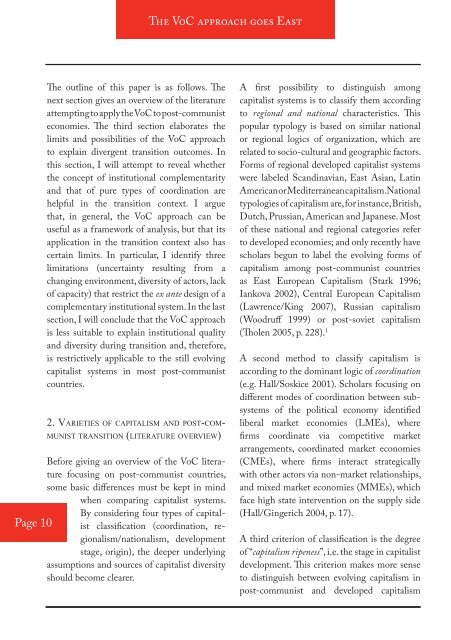Heft36 1 - SFB 580 - Friedrich-Schiller-Universität Jena
Heft36 1 - SFB 580 - Friedrich-Schiller-Universität Jena
Heft36 1 - SFB 580 - Friedrich-Schiller-Universität Jena
You also want an ePaper? Increase the reach of your titles
YUMPU automatically turns print PDFs into web optimized ePapers that Google loves.
THE VOC EINLEITUNG APPROACH GOES EAST<br />
The outline of this paper is as follows. The<br />
next section gives an overview of the literature<br />
attempting to apply the VoC to post-communist<br />
economies. The third section elaborates the<br />
limits and possibilities of the VoC approach<br />
to explain divergent transition outcomes. In<br />
this section, I will attempt to reveal whether<br />
the concept of institutional complementarity<br />
and that of pure types of coordination are<br />
helpful in the transition context. I argue<br />
that, in general, the VoC approach can be<br />
useful as a framework of analysis, but that its<br />
application in the transition context also has<br />
certain limits. In particular, I identify three<br />
limitations (uncertainty resulting from a<br />
changing environment, diversity of actors, lack<br />
of capacity) that restrict the ex ante design of a<br />
complementary institutional system. In the last<br />
section, I will conclude that the VoC approach<br />
is less suitable to explain institutional quality<br />
and diversity during transition and, therefore,<br />
is restrictively applicable to the still evolving<br />
capitalist systems in most post-communist<br />
countries.<br />
2. VARIETIES OF CAPITALISM AND POST-COM-<br />
MUNIST TRANSITION (LITERATURE OVERVIEW)<br />
Before giving an overview of the VoC literature<br />
focusing on post-communist countries,<br />
some basic differences must be kept in mind<br />
when comparing capitalist systems.<br />
By considering four types of capitalist<br />
classification (coordination, re-<br />
Seite Page page 10<br />
gionalism/nationalism, development<br />
stage, origin), the deeper underlying<br />
assumptions and sources of capitalist diversity<br />
should become clearer.<br />
A first possibility to distinguish among<br />
capitalist systems is to classify them according<br />
to regional and national characteristics. This<br />
popular typology is based on similar national<br />
or regional logics of organization, which are<br />
related to socio-cultural and geographic factors.<br />
Forms of regional developed capitalist systems<br />
were labeled Scandinavian, East Asian, Latin<br />
American or Mediterranean capitalism. National<br />
typologies of capitalism are, for instance, British,<br />
Dutch, Prussian, American and Japanese. Most<br />
of these national and regional categories refer<br />
to developed economies; and only recently have<br />
scholars begun to label the evolving forms of<br />
capitalism among post-communist countries<br />
as East European Capitalism (Stark 1996;<br />
Iankova 2002), Central European Capitalism<br />
(Lawrence/King 2007), Russian capitalism<br />
(Woodruff 1999) or post-soviet capitalism<br />
(Tholen 2005, p. 228). 1<br />
A second method to classify capitalism is<br />
according to the dominant logic of coordination<br />
(e.g. Hall/Soskice 2001). Scholars focusing on<br />
different modes of coordination between subsystems<br />
of the political economy identified<br />
liberal market economies (LMEs), where<br />
firms coordinate via competitive market<br />
arrangements, coordinated market economies<br />
(CMEs), where firms interact strategically<br />
with other actors via non-market relationships,<br />
and mixed market economies (MMEs), which<br />
face high state intervention on the supply side<br />
(Hall/Gingerich 2004, p. 17).<br />
A third criterion of classification is the degree<br />
of “capitalism ripeness”, i.e. the stage in capitalist<br />
development. This criterion makes more sense<br />
to distinguish between evolving capitalism in<br />
post-communist and developed capitalism
















